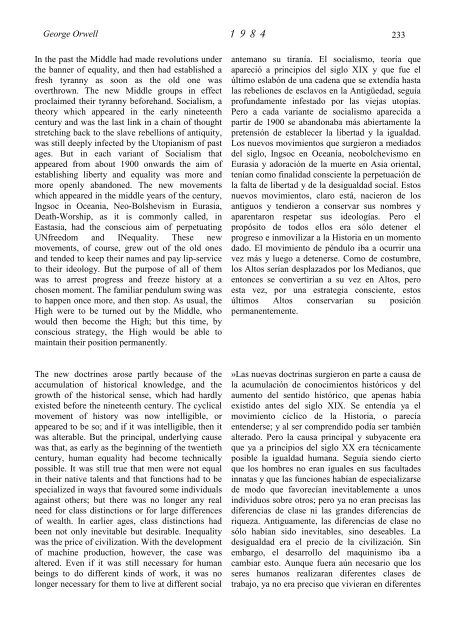Create successful ePaper yourself
Turn your PDF publications into a flip-book with our unique Google optimized e-Paper software.
George Orwell 1 9 8 4<br />
In the past the Middle had made revolutions under<br />
the banner of equality, and then had established a<br />
fresh tyranny as soon as the old one was<br />
overthrown. The new Middle groups in effect<br />
proclaimed their tyranny beforehand. Socialism, a<br />
theory which appeared in the early nineteenth<br />
century and was the last link in a chain of thought<br />
stretching back to the slave rebellions of antiquity,<br />
was still deeply infected by the Utopianism of past<br />
ages. But in each variant of Socialism that<br />
appeared from about 1900 onwards the aim of<br />
establishing liberty and equality was more and<br />
more openly abandoned. The new movements<br />
which appeared in the middle years of the century,<br />
Ingsoc in Oceania, Neo-Bolshevism in Eurasia,<br />
Death-Worship, as it is commonly called, in<br />
Eastasia, had the conscious aim of perpetuating<br />
UNfreedom and INequality. These new<br />
movements, of course, grew out of the old ones<br />
and tended to keep their names and pay lip-service<br />
to their ideology. But the purpose of all of them<br />
was to arrest progress and freeze history at a<br />
chosen moment. The familiar pendulum swing was<br />
to happen once more, and then stop. As usual, the<br />
High were to be turned out by the Middle, who<br />
would then become the High; but this time, by<br />
conscious strategy, the High would be able to<br />
maintain their position permanently.<br />
The new doctrines arose partly because of the<br />
accumulation of historical knowledge, and the<br />
growth of the historical sense, which had hardly<br />
existed before the nineteenth century. The cyclical<br />
movement of history was now intelligible, or<br />
appeared to be so; and if it was intelligible, then it<br />
was alterable. But the principal, underlying cause<br />
was that, as early as the beginning of the twentieth<br />
century, human equality had become technically<br />
possible. It was still true that men were not equal<br />
in their native talents and that functions had to be<br />
specialized in ways that favoured some individuals<br />
against others; but there was no longer any real<br />
need for class distinctions or for large differences<br />
of wealth. In earlier ages, class distinctions had<br />
been not only inevitable but desirable. Inequality<br />
was the price of civilization. With the development<br />
of machine production, however, the case was<br />
altered. Even if it was still necessary for human<br />
beings to do different kinds of work, it was no<br />
longer necessary for them to live at different social<br />
233<br />
antemano su tiranía. El socialismo, teoría que<br />
apareció a principios del siglo XIX y que fue el<br />
último eslabón de una cadena que se extendía hasta<br />
las rebeliones de esclavos en la Antigüedad, seguía<br />
profundamente infestado por las viejas utopías.<br />
Pero a cada variante de socialismo aparecida a<br />
partir de 1900 se abandonaba más abiertamente la<br />
pretensión de establecer la libertad y la igualdad.<br />
Los nuevos movimientos que surgieron a mediados<br />
del siglo, Ingsoc en Oceanía, neobolchevismo en<br />
Eurasia y adoración de la muerte en Asia oriental,<br />
tenían como finalidad consciente la perpetuación de<br />
la falta de libertad y de la desigualdad social. Estos<br />
nuevos movimientos, claro está, nacieron de los<br />
antiguos y tendieron a conservar sus nombres y<br />
aparentaron respetar sus ideologías. Pero el<br />
propósito de todos ellos era sólo detener el<br />
progreso e inmovilizar a la Historia en un momento<br />
dado. El movimiento de péndulo iba a ocurrir una<br />
vez más y luego a detenerse. Como de costumbre,<br />
los Altos serían desplazados por los Medianos, que<br />
entonces se convertirían a su vez en Altos, pero<br />
esta vez, por una estrategia consciente, estos<br />
últimos Altos conservarían su posición<br />
permanentemente.<br />
»Las nuevas doctrinas surgieron en parte a causa de<br />
la acumulación de conocimientos históricos y del<br />
aumento del sentido histórico, que apenas había<br />
existido antes del siglo XIX. Se entendía ya el<br />
movimiento cíclico de la Historia, o parecía<br />
entenderse; y al ser comprendido podía ser también<br />
alterado. Pero la causa principal y subyacente era<br />
que ya a principios del siglo XX era técnicamente<br />
posible la igualdad humana. Seguía siendo cierto<br />
que los hombres no eran iguales en sus facultades<br />
innatas y que las funciones habían de especializarse<br />
de modo que favorecían inevitablemente a unos<br />
individuos sobre otros; pero ya no eran precisas las<br />
diferencias de clase ni las grandes diferencias de<br />
riqueza. Antiguamente, las diferencias de clase no<br />
sólo habían sido inevitables, sino deseables. La<br />
desigualdad era el precio de la civilización. Sin<br />
embargo, el desarrollo del maquinismo iba a<br />
cambiar esto. Aunque fuera aún necesario que los<br />
seres humanos realizaran diferentes clases de<br />
trabajo, ya no era preciso que vivieran en diferentes


